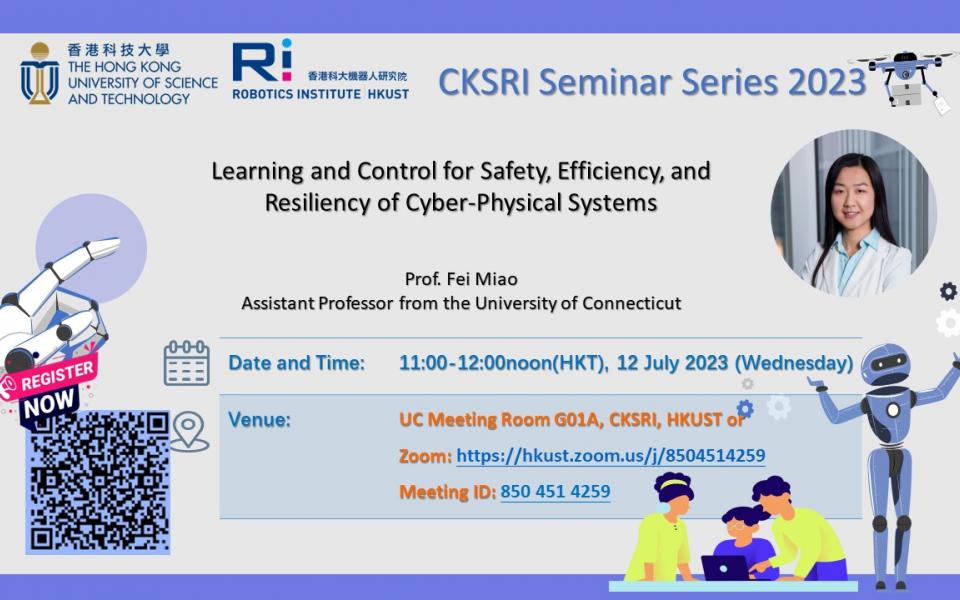CKSRI Seminar Series 2023 "Towards Rigorous Use of Neural Networks in Nonlinear Control"
Abstract: The rapid evolution of ubiquitous sensing, communication, and computation technologies has revolutionized of cyber-physical systems (CPS) and IoT in virous fields, such as robotics and autonomy, smart grids, aerospace, and smart cities. Integrating learning-based methodologies into CPS control unlocked vast opportunities for AI-enabled systems. However, current decision-making frameworks lack a comprehensive understanding of the tridirectional relationship among communication, learning and control, posing challenges to design effective methodologies for multi-agent systems operating in complex and dynamic environments. To tackle these challenges, in the first part of the talk, we focus on learning and control with information sharing that leverages communication capabilities. We begin by introducing an uncertainty quantification method designed for collaborative perception in connected autonomous vehicles (CAVs). Our findings demonstrate that communication among multiple agents can enhance object detection accuracy and reduce uncertainty. Building upon this, we develop a safe and scalable deep multi-agent reinforcement learning (MARL) framework that leverages shared information among agents to improve system safety and efficiency. We validate the benefits of communication in MARL, particularly in the context of CAVs in challenging mixed traffic scenarios. To incentivize agents to communicate and coordinate, we design a novel stable and efficient reward reallocation scheme based on Shapley value for MARL. Additionally, we present our theoretical analysis of robust MARL methods under state uncertainties, such as uncertainty quantification in the perception modules or worst-case adversarial state perturbations. In the second part of the talk, we briefly outline our research contributions on data-driven robust optimization for autonomous mobility-on-demand (AMoD) systems and sustainable mobility. We also highlight our research results concerning CPS security and provide insights into our ongoing work in the field of learning and control. Through our findings, we aim to advance AI-enabled CPS for safer, efficient, and resilient systems in dynamic environments.
Fei Miao is an Assistant Professor of the Department of Computer Science & Engineering, a Courtesy Faculty of the Department of Electrical & Computer Engineering, University of Connecticut, since 2017. She is also affiliated to the Institute of Advanced Systems Engineering and Eversource Energy Center. She will be promoted to associate professor with tenure in Fall 2023. She was a postdoc researcher at the GRASP Lab and the PRECISE Lab of Upenn from 2016 to 2017. She received the Ph.D. degree and the Best Doctoral Dissertation Award in Electrical and Systems Engineering, with a dual M.S. degree in Statistics from the University of Pennsylvania in 2016. She received the B.S. degree in Automation from Shanghai Jiao Tong University in 2010. Her research focuses on multi-agent reinforcement learning, robust optimization, uncertainty quantification, and control theory, to address safety, efficiency, robustness, and security challenges of cyber-physical systems, for systems such as connected autonomous vehicles, sustainable and intelligent transportation systems, smart grids, and smart cities. Dr. Miao is a receipt of the NSF CAREER award and a couple of other awards from NSF. She received the Best Paper Award and Best Paper Award Finalist at the 12th and 6th ACM/IEEE International Conference on Cyber-Physical Systems (ICCPS) in 2021 and 2015, Best paper Award at the 2023 AAAI DACC workshop, respectively.
